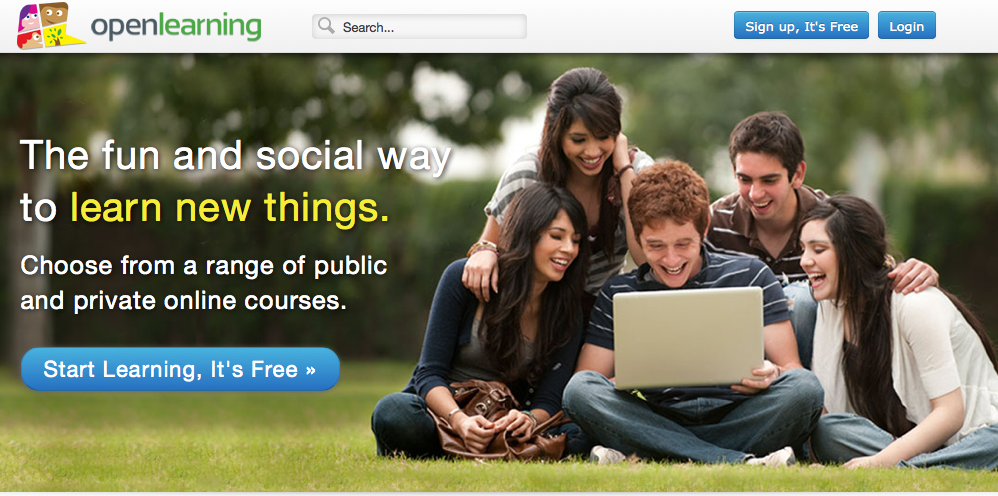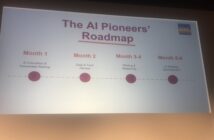Online learning platform OpenLearning is due to launch in October (it is currently in beta). LearnPatch asked CEO Adam Brimo and lead developer David Collien about the product and its approach to engaging learners.
In your own words, can you describe what the OpenLearning platform provide for its users?
The OpenLearning platform provides a social and collaborative area for teachers to create courses. A course can include a range of content (audio, video, text), blogs, quizzes and different types of assignments. OpenLearning’s system is based around the principles of student autonomy, diversity of learning materials, open-ness of resources and social interactivity. The software encourages students and teachers alike to aggregate, remix and repurpose learning resources within a course, to create a rich, motivating and constructive environment in which meaningful learning experiences are stimulated. This allows students to help each other more effectively and improve the course as they progress through it.
What functionality in particular does it provide for teachers and students?
OpenLearning has an everywhere-is-a-forum approach to its content and has a rich set of commenting, rating and aggregating features to allow a crowdsourcing and community centred approach to the enrichment of the online learning environment. Much of OpenLearning’s functionality is geared towards the enjoyment of the learning experience, with features designed to motivate both course progression and community involvement.
Some examples are the visual communication of your course progress and community involvement, social-media style notifications of new discussions and course interactions, rated and user-commended content and the aggregation and suggestion of the most useful related resources.
You say it is a fun and social way to learn. How do you make it fun and social?
Students and teachers can comment and have discussions around any content on OpenLearning. Students can earn Karma points when another person likes one of their comments, forming the basis of a qualitative assessment of a person’s contribution to the community.
Rather than focusing on marks or grades, a simple progress bar follows students around their course. The progress bar will always be green so long as the student has completed all the assignments that have been released so far. When a new assignment is released, the progress bar will decrease slightly until the student has completed the task. The progress bar motivates students to keep up with the course and provides direct feedback to the student.
Students are encouraged to communicate with each other and to create and share content. New content can be discovered through a newsfeed type page in a course and people can rate the content they find the most useful.
You say it is addictive – how have you made it addictive as a teaching tool?
Compelling and immersive are probably better words. OpenLearning is in part inspired by the social media and social networking space. As existing social media has shown us, interacting with others and sharing resources in an open medium can be very captivating. OpenLearning’s environment is designed towards tuning these social dynamics to provide enjoyment via fellowship, shared discovery, self-expression and providing interesting challenges along the way. The aim is to maximise motivation and fascination with course topics to entice everyone to become life-long learners.
The OpenLearning platform is also working on extending its system to allow the community to contribute to the development of interactive activities or simulations to plug into the platform. This way students can be immersed in an abundance of meaningful experiences and situations, through playful experimentation.
Is the platform for the education market alone?
We have a substantial background in teaching and education so that is our main focus. However, the OpenLearning platform is flexible enough to be used for corporate training courses and professional courses. We will not be targeting that market initially however we expect businesses to begin using OpenLearning and adapting it for their needs.
How do you plan to monetize it?
We welcome people to create public open courses for free. We plan to charge organisations, universities and colleges to run private courses where they can restrict enrolment in their course.
You see an opportunity in the market – why is there such an opportunity now?
Student’s familiarity with Facebook and Wikipedia along with the maturity of web applications and technology has contributed to this being the perfect time to launch OpenLearning. It has also taken many years of research to test different teaching platforms and concepts before we determined that OpenLearning is the future of learning online.
Many universities and schools aren’t satisfied with the current ways of teaching courses both online and offline. They are looking for something that engages and motivates students while ensuring that they complete their courses.
What tech is it built on?
The backend is in Python, using the Django framework. The frontend uses javascript, mainly with jQuery and the Bootstrap UI framework. The database is mongoDB and we host the application/database servers on Rackspace. We use Amazon for a CDN.
Is it designed to work alongside other school/college platforms and networks?
It does not currently work with existing platforms however we have the ability to develop applications that extend the functionality of OpenLearning. For example, one of the applications we have developed is an automatic marking system for C programming assignments. Schools and developers will have the ability to develop their own applications for OpenLearning to customise it for their needs.
Does it have an app for tablet/mobile use?
We don’t currently have a dedicated mobile app however the web interface scales down for mobile and tablet sized screens.
Where would you like this product to be in five years’ time?
We would like OpenLearning to host thousands of public and private courses from around the world. We believe that people have the knowledge and ability to create and contribute to courses themselves. We will provide the platform to these people along with universities and schools worldwide to improve education for everyone.
Who has developed it and how long has it taken to develop?
OpenLearning was formed towards the end of 2011 and has spent about a year in development. The ideas and concepts for OpenLearning extend further back from the work of senior lecturer Richard Buckland. The OpenLearning team has grown to five full time members in recent months as we prepare to launch a few large online courses in October.




